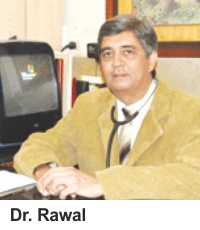The GP or general physician who made home visits at unearthly hours no longer makes house calls. But with the population and its ailments having multiplied, the demand for the GP’s services is still strong

The healer’s vocation is one of the oldest professions in recorded history with the medicine man, Shaman and Ayurveda practitioner always accorded a place of honour in society. Which is perhaps why even today the study of modern medicine, i.e allopathy, is among the first choices of middle class parents intent upon securing the future of their children.
However, with the study of medicine becoming highly specialised, and most aspiring medical practitioners branching out to specialise as cardiologists, plastic surgeons, neurologists etc, the modestly qualified general physician and the respect he once enjoyed, has all but retreated into history. At one time a familiar and often pivotal character in novels, movies and television soaps, the genial GP or family physician who made home visits at unearthly hours because of his close bonds with the local community, no longer makes house calls. But with the population of the country having crossed the billion mark, and health problems rising, the demand for the GP’s services is as strong as it has ever been.
 “Undoubtedly GPs who used to be the first line of defence against ill-health and ailments and played an important role in dispensing preventive medical advice, have been steadily losing ground in the metros. The trend within more aware, tech-savvy and affluent people is to self-medicate with the help of the Internet or rush to the chemist instead of a GP. However, the demand for GPs will always be high since India has a large rural population and a great dearth of doctors. Moreover even in the country’s metros, the under-class majority still visit the GP when they feel unwell,’’ says Dr. Sanjiv Rawal, a Mumbai-based medical practitioner who has more than 40 years experience in the medical and allied professions.
“Undoubtedly GPs who used to be the first line of defence against ill-health and ailments and played an important role in dispensing preventive medical advice, have been steadily losing ground in the metros. The trend within more aware, tech-savvy and affluent people is to self-medicate with the help of the Internet or rush to the chemist instead of a GP. However, the demand for GPs will always be high since India has a large rural population and a great dearth of doctors. Moreover even in the country’s metros, the under-class majority still visit the GP when they feel unwell,’’ says Dr. Sanjiv Rawal, a Mumbai-based medical practitioner who has more than 40 years experience in the medical and allied professions.
Study Programmes. Currently four main systems of medicine are taught and practiced in India — allopathy, homeopathy, ayurveda and unani — with allopathy and homeopathy being the most popular study options of aspiring medical practitioners. The basic medical degree study programmes are the MBBS (bachelor of medicine & surgery); BAMS (bachelor of aurvedic medicine & surgery); BHMS (bachelor of homeopathic medicine & surgery), and BUMS (bachelor of unani medicine & surgery). All of them require four-and-a-half years of study followed by one year of compulsory rotatory internship. Interns are required to work in all departments and acquire a broad, hands-on experience of the medical profession.
The minimum qualification for enrolment in an MBBS/BAMS/BHMS/BUMS study programme in India is Plus Two (class XII) certification in the science stream, and clearance of the National Eligibility cum Entrance Test (NEET).
Prominent medical colleges include: All India Institute of Medical Sciences (AIIMS), Delhi; Christian Medical College, Vellore; and Jawaharlal Nehru Institute of Medical Education and Research (JIPMER), Pondicherry.
The great majority of duly qualified and certified GPs tend to seek employment in government dispensaries or private hospitals in urban and rural areas. Exercising the private practice option which requires establishing a private clinic is a more remunerative option, but sky-high real estate prices, particularly in the metros, are a major deterrant. Nevertheless for the fortunate minority who have the wherewithal to set up private practice and suffer the inevitable waiting period, the GP’s calling can prove a fulfilling career, particularly for those with a desire to serve humanity.
“The GP will always be in demand. As a developing country, we should learn from China which has certified millions of ‘barefoot GPs’ all over the country, rendering valuable service to local communities,” says Rawal.
After acquiring his MBBS degree from Nair Hospital’s Topiwala National Medical College, Mumbai in 1976, Dr. Rawal established a private practice in south Mumbai in 1978. A great votary of continuous education and skills development, even as his practice flourished, Rawal signed up for a diploma programme in acupuncture in 2002 with the Indian Institute of Acupuncture, Aurangabad. Subsequently he studied criminal law and acquired an LLB degree from K.C. Law College, Mumbai and an LLM from Mumbai University in 2006. And recently he wrote the acupuncture degree examination of Vinayak University, Aurangabad, an affiliate of IGNOU, Delhi.
For those interested in healing the general populace as opposed to the upper crust of society, the practice of general medicine has its own rewards, believes Rawal. “Unlike specialists, GPs remain in touch with the common people,” he says.
(Excerpted and adapted from 101 Great Careers for the 21st Century by Indra Gidwani, 2016)























